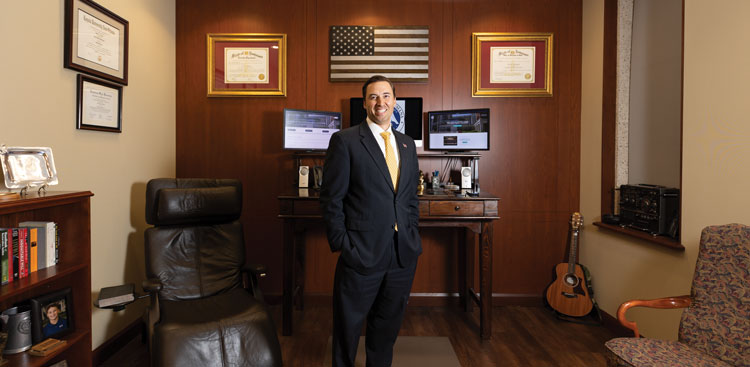By Lyle Moran

Photo of Judge Scott Schlegel by Kathy Anderson Photography/ABA Journal
Soon after his 2013 election to the bench in Louisiana’s 24th Judicial District, Judge Scott Schlegel started looking for ways to repurpose technology common in the private sector for deployment in the court system.
Noticing that judges were limited in their use of electronic signatures, he and the local clerk of court successfully pushed for state legislation that allowed bench officers to greatly expand their use of that digital tool. Additionally, the Jefferson Parish judge transitioned from having his department use a big red book for scheduling civil matters to an online calendaring approach. Aided by the new calendaring system’s integration with videoconferencing, Schlegel, 43, began offering attorneys the opportunity to conduct their pretrial hearings via video.
Schlegel’s history of embracing technology in hopes of making the justice system more efficient has served him—and those who interact with his court—particularly well during the COVID-19 pandemic. Amid fears that the novel coronavirus would spread rapidly in jails, Schlegel worked to create a process whereby the increasing number of motions to reduce bond could be heard via video and within a short time frame.
This involved the judge’s criminal clerk notifying the key parties in the justice system when such a motion was filed and the judge following-up via Slack, an online instant messaging system, to determine whether the motion could be heard that day or the next day.
“We would handle it in a very expeditious manner because everybody was on the same collaboration platform,” says Schlegel, referring to Slack.
The judge notes this was one of several initiatives undertaken during COVID-19 that benefited greatly from his years of working with the various justice partners in the area on technology projects.
“After you understand your workflow, you build your partnerships,” Schlegel says. “Then find the tech stack that fits your needs and your budgets.”
Schlegel has also collaborated with legal technology companies to help keep the justice system operational during the ongoing public health crisis. For example, the judge teamed with LawDroid CEO Tom Martin to develop a text-based chatbot to check in with the specialty court probationers under the judge’s jurisdiction given COVID-19 restrictions on in-person gatherings. Case managers and probation officers would be notified immediately if a probationer responded to a message that he or she was not doing well, and they would also be prompted to follow up with a probationer who did not respond to a message.
Schlegel also partnered with Documate CEO Dorna Moini, a 2019 Legal Rebel, to develop an online guilty plea form that was launched amid COVID-19. A defendant’s completion of the form paves the way for Schlegel to host a video hearing in which the plea is formally accepted. During these hearings, the judge gives defendants the chance to speak with their attorneys in a virtual breakout room.
Paul C. Fleming Jr., the deputy district defender for the Jefferson Parish public defender’s office, says he has been able to more effectively assist clients than public defenders in other parts of the state where courts have not implemented technology to the same degree. After having never used Zoom before March, Fleming has appeared in video hearings before Schlegel and other local judges. “I was very reluctant to do all of this,” Fleming says. In the end, however, “Judge Schlegel made a believer of me.”
Meanwhile, the guilty plea form Documate created was among the items Schlegel included on a website he launched, courtonline.us, within a week of the court buildings being shut down during COVID-19. The site also provides access to videoconferences with other 24th Judicial District Court judges and various resources for self-represented litigants. As the pandemic raged on, Schlegel launched onlinejudge.us to provide resources to those with civil matters in his courtroom.
Schlegel, who was named the chair of the new Louisiana Supreme Court Technology Commission in September, says the increased adoption of technology in Louisiana’s courts will serve the state well both in the near and long term. “The ability to continue with some level of services even if we are hit with another pandemic or hit with another hurricane or natural disaster, enables our citizenry to continue to bring their needs to the court steps if necessary,” Schlegel says.
The judge spends his free time with his wife, Laurie, and their teenage son, Luke. He also taught himself how to play the guitar in recent years.
Read more: 2021 Legal Rebels: Meet 10 legal professionals who are courting change